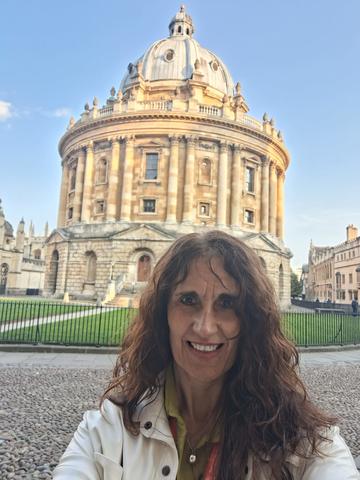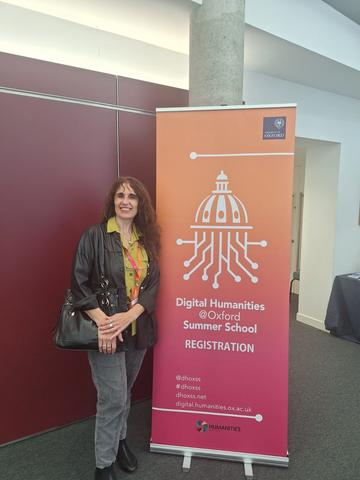DHOXSS 2025 - Introduction to TEI
Sandra Gisela Martin was awarded a bursary to attend the Introduction to TEI strand of the Digital Humanities Oxford Summer School in 2025. To join the mailing list and learn about the next summer school sign up here. Read about Sandra's experience at the summer school here:
Director, Library System. Universidad Católica de Córdoba
I am deeply grateful to Oxford University for selecting me to participate in the Digital Humanities course at the Oxford Summer School (DHOxSS), which took place from August 4 to 8. I would also like to thank Gale for awarding me a scholarship that covered my registration, travel, and accommodation costs.
DHOxSS is an annual training event that brings together students, academics, and professionals from different disciplines who wish to master the tools, techniques, and research methods of digital humanities.
This year, the program offered a series of keynote lectures and interactive workshops, with six courses on topics such as data analysis, Text Encoding Initiative (TEI), humanistic data, introduction to digital humanities, and the use of artificial intelligence in research libraries.
I would like to highlight two sessions that were particularly significant: the opening and closing sessions. The first, entitled “Creativity and the Machine: Writing, Literature, AI,” was given by Caroline Bassett, Director of Cambridge Digital Humanities at the University of Cambridge. The second, “Text on Maps: Bridging the Spatial/Textual Divide in Digital Humanities,” was led by Katherine McDonough, Senior Researcher at the Alan Turing Institute.
I chose to take the TEI workshop, which allowed me to understand the key aspects of XML markup language and familiarize myself with the schema guidelines. This training was essential for understanding its implementation in research projects that work with text encoding or editing.
The TEI course began with an introduction to its principles and its relationship with XML markup language. The theoretical foundations of TEI were provided and its relevance to research in Digital Humanities was contextualized. Through practical exercises using the Oxygen XML editor, as participants we learned to create, edit, and transform TEI documents, familiarizing ourselves with the basic concepts of the header and body of files to mark up structure, transcriptions, names, and dates.
The program delved into advanced applications of TEI, exploring its use as a data source for critical analysis. Case studies from real projects, such as the Darwin Correspondence Project and the Newton Project, were presented, demonstrating how the TEI schema is applied to the encoding of manuscripts, correspondence, and other primary documents. Techniques such as using XPath to query data and customizing schemas to optimize TEI document creation were taught. The aim of the course was to provide participants with the skills necessary to use TEI not only as a descriptive tool, but as a fundamental resource for academic research.
In addition to the training, I was able to enjoy social events, such as the drinks reception on the first day, a walking tour of Oxford, and a gala dinner at a historic Oxford college, St Hilda's College.
DHOxSS 2025 was a very enriching experience that allowed me, on the one hand, to expand my knowledge, acquire new soft and technical skills, and understand the vast potential of digital humanities. On the other hand, it enabled me to network with a global community of professionals from disciplines such as philology, linguistics, history, archival science, library science, engineering, and others.
As director of the Library System at the Catholic University of Córdoba, Argentina, I sought to gain an in-depth understanding of the possibilities of digital humanities and specifically the TEI standard in order to develop a project to digitize the Archive of the Movement of Priests for the Third World (MSTM), part of the Meisegeier Collection – Mugica Archive, which in 2024 was incorporated into the Memory of the World Register for Latin America and the Caribbean, promoted by UNESCO.
This archive is a unique collection of documents spanning from 1966 to 1983, offering valuable testimony to the struggle of priests committed to social justice in a context of repression and transformation. It includes books, correspondence, circulars, newsletters, photographs, press clippings, and other materials documenting the interaction between the MSTM and social and religious movements in Argentina and other Latin American countries.
A digitization plan is planned that will not be limited to the generation of unstructured PDF files, but will enrich the digital objects through structured markup proposed by the TEI standard. This approach seeks to integrate digital library practices with digital humanities to promote access, preservation, and analysis of the content of documentary materials.
That is why the TEI course has allowed me to acquire the necessary training to design this project, laying the groundwork for seeking funding to enable its implementation.






